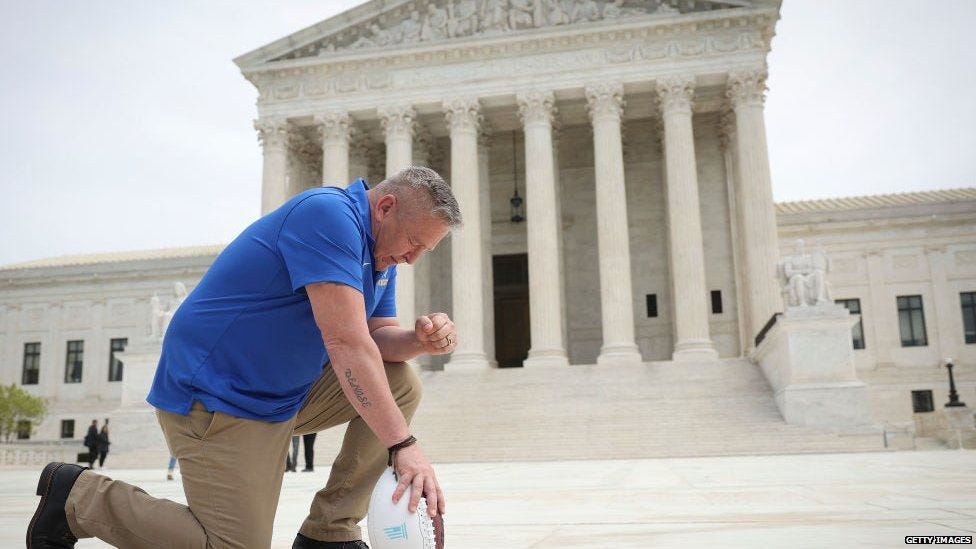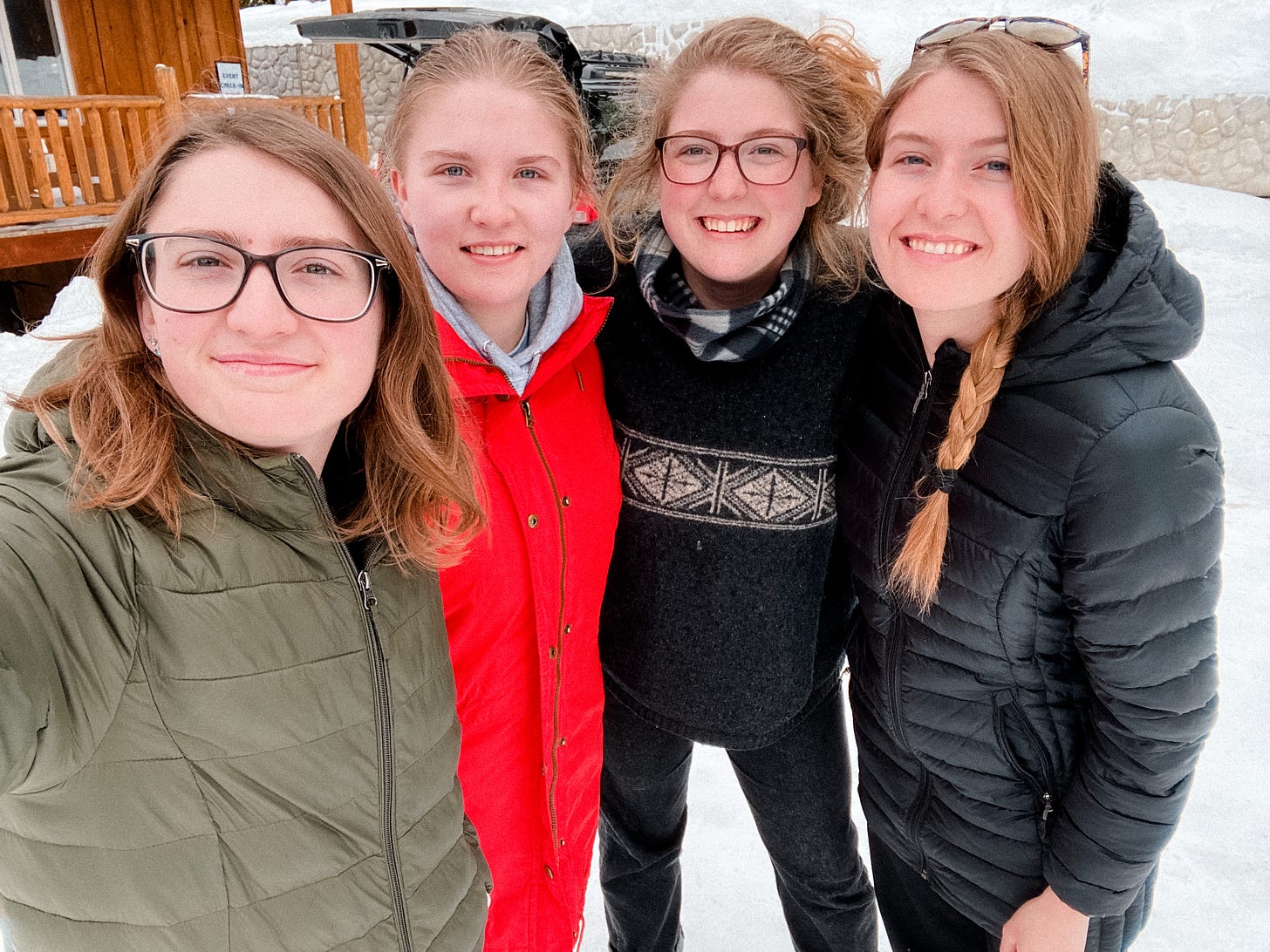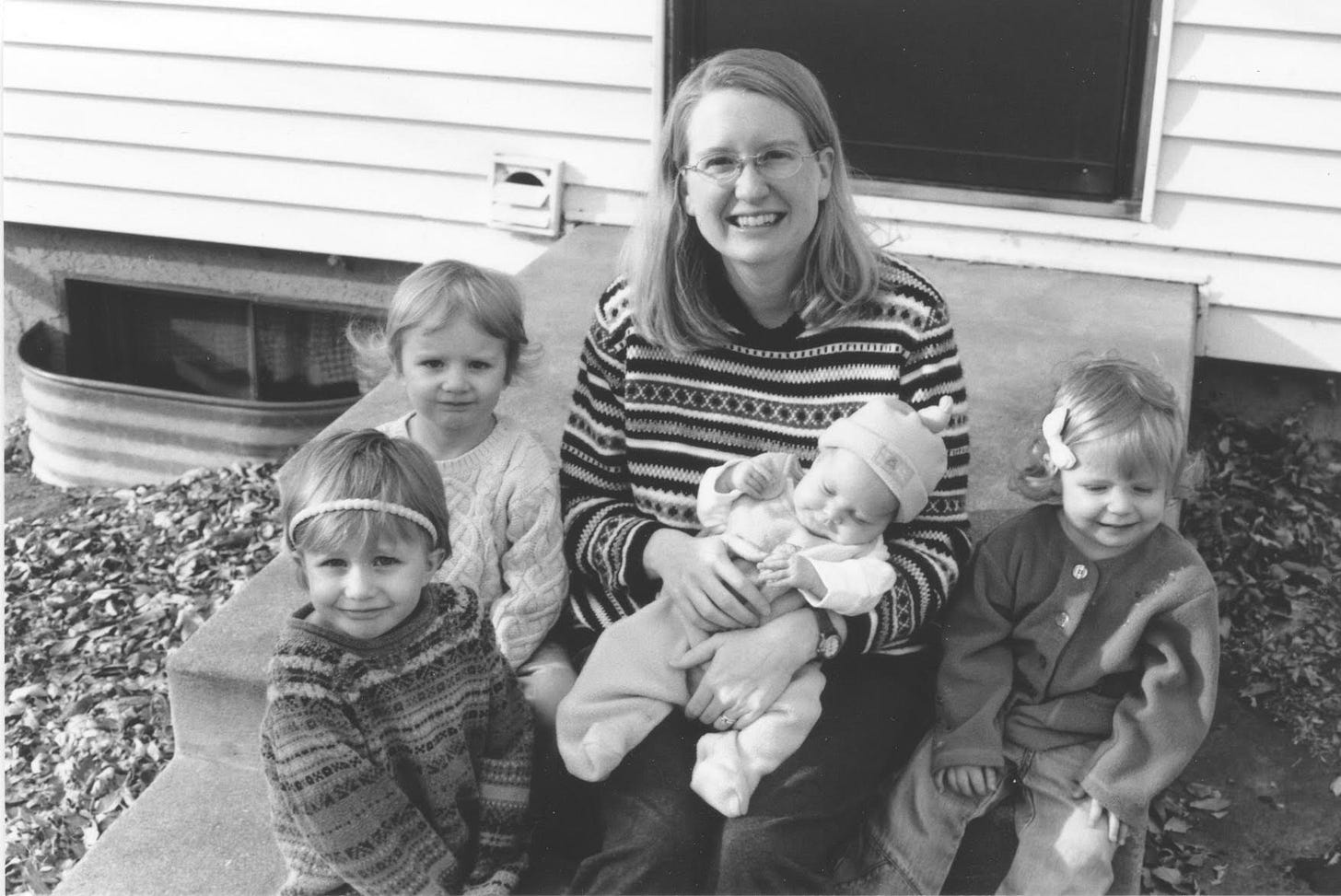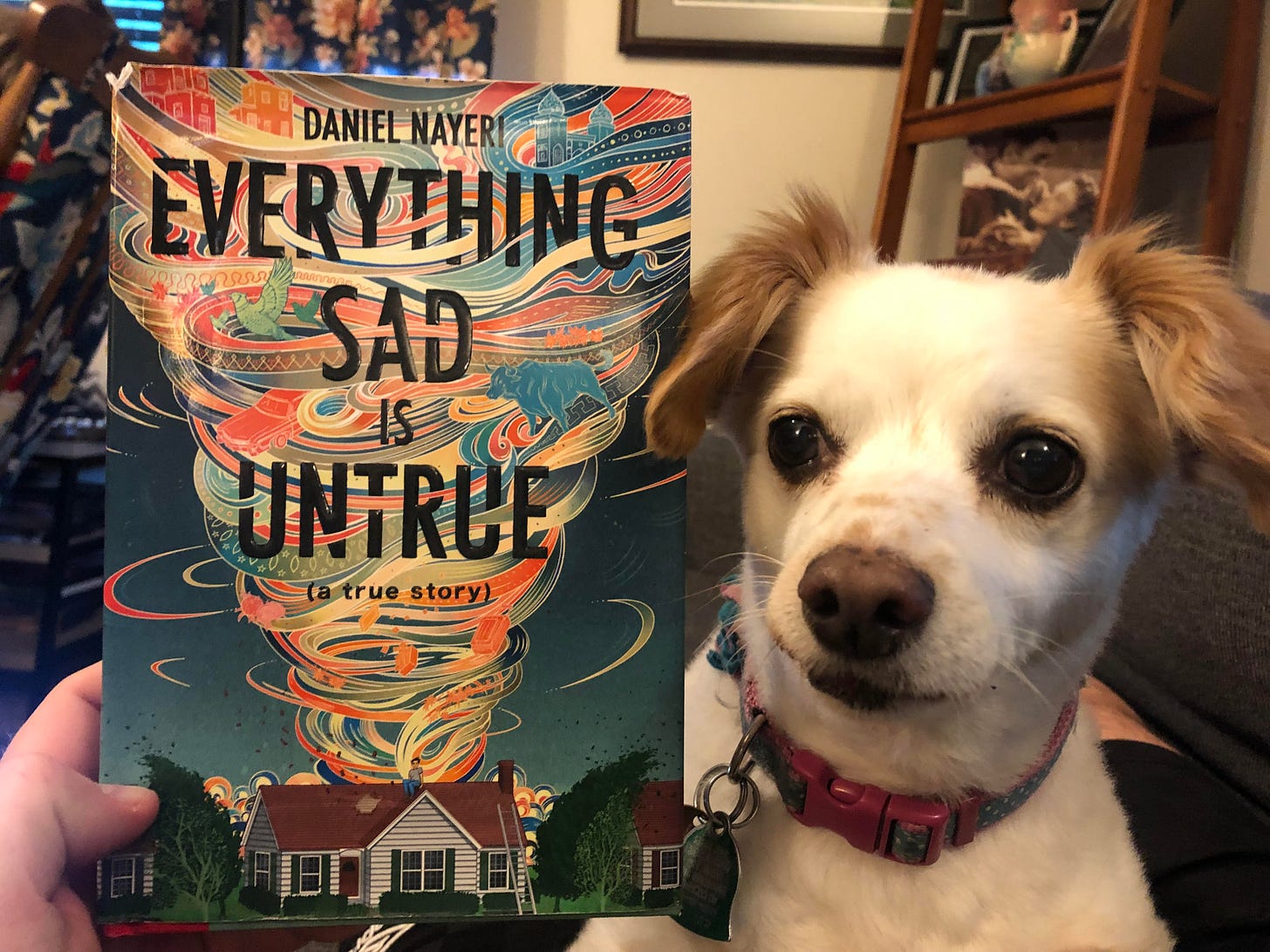After Roe
A Letter to My Young Adult Daughters about the Dobbs Decision
Dear Reader,
Substack has a new polling feature that comes at a good time here midway through the calendar year. Would you take 30 seconds to anonymously answer these three questions?
If there are more specifics you’d like to share, I’d be glad to read them. Send me an email and let me know more of your newsletter reading experience, as well as any suggestions you’d make.
As always, thanks for reading Second Drafts.
Craig
PS: This week’s newsletter is a long one. Gmail clips emails at 102K, so you may need to continue reading it in your browser (just click “View Entire Message” at the end of the email).
Hot Takes
“Supreme Court Further Erodes Separation Between Church and State in Case of Praying Football Coach” - Ridiculous headline from CNN aside, the Court made the right call on this decision for the sake of upholding religious freedoms in our pluralistic society.
“The Supreme Court said Monday that a Washington state school district violated the First Amendment rights of a high school football coach when he lost his job after praying at the 50-yard line after games.
The opinion was 6-3 along conservative-liberal ideological lines.
‘The Constitution and the best of our traditions counsel mutual respect and tolerance, not censorship and suppression, for religious and nonreligious views alike,’ Justice Neil Gorsuch wrote in the majority opinion.
The court said coach Joe Kennedy's prayers amounted to private speech, protected by the First Amendment, and could not be restricted by the school district.”
However, the coach (and Christians everywhere) needs to really ask himself if walking out to the middle of a football field to pray after a game lines up with Jesus’ teaching in Matthew 6 to “go into your room, close the door and pray to your Father, who is unseen.” Isn't it a question of appropriateness? Doesn't running a quality football program that cares for his players and does things well honor God?
When I used to coach JV baseball, we experienced a tremendous amount of success as part of a high school program ranked in the top twenty in the nation. The thought of going out to the pitcher’s mound to kneel and pray after a game never crossed my mind as being requisite to honor God; we did it (and talked about doing it) in the way we respected each other, practiced with excellence, took the field, played the game, carried ourselves, dealt with bad calls, served the visiting team when they came to us, and competed to the best of our ability.
That doesn't mean I didn’t pray; I did. I just didn’t do it with people watching. Indeed, my desire would be for God’s honor, but the reality would most likely (at least partially) be also for mine, as I’ve never had a pure motive in my life.
Now that his case has been settled, I have two hopes: 1) that he'll be reinstated as football coach; and 2) that he'll give more thought as to how to keep his witness from becoming a show (the fact that the picture below got posed for and snapped is problematic and a total photo op).
“US Newspapers Continuing to Die at Rate of 2 Each Week” - This is a sad story, but it didn’t have to be this way, even with the dawn of the Internet age.
“Despite a growing recognition of the problem, the United States continues to see newspapers die at the rate of two per week, according to a report issued Wednesday on the state of local news. Areas of the country that find themselves without a reliable source of local news tend to be poorer, older and less educated than those covered well, Northwestern University’s Medill School of Journalism, Media and Integrated Marketing Communications said.
The country had 6,377 newspapers at the end of May, down from 8,891 in 2005, the report said. While the pandemic didn’t quite cause the reckoning that some in the industry feared, 360 newspapers have shut down since the end of 2019, all but 24 of them weeklies serving small communities. An estimated 75,000 journalists worked in newspapers in 2006, and now that’s down to 31,000, Northwestern said. Annual newspaper revenue slipped from $50 billion to $21 billion in the same period.”
As easy as it is to blame the Internet (though there is some blame to lay at the feet of free digital content), the solution is three-fold: 1) bring back fact-driven news reporting (rather than opinionated bias—I’m looking at you, Bozeman Daily Chronicle); 2) recruit and support your own writers worth paying for (rather than just filling pages with stories from the AP or UPI); and 3) cultivate local ownership that has an actual stake in the community (rather than a conglomerate that’s not even in state).
“Much of the industry churn is driven by the growth in newspaper chains, including new regional chains that have bought hundreds of newspapers in small or mid-sized markets, the report said. Less than a third of the country’s 5,147 weekly newspapers and just a dozen of the 150 large metro and regional daily papers are now locally-owned and operated, Medill said.”
Just as local farms are increasingly giving way to corporate farming, so is local journalism continuing to get sucked up by billionaires and media corporations. I’ve always subscribed to a local newspaper (even reluctantly to the Chronicle), but local leadership has to figure this out and fast, lest local news go the way of the dodo.
After Roe: A Letter to My Young Adult Daughters about the Dobbs Decision
Earlier this week, I read “After Roe: A Letter to My Teenage Daughter about the Dobbs Decision” by former First Things and The Week writer, Damon Linker. In the letter, Linker laments the recent Supreme Court decision concerning Dobbs vs. Jackson that resulted in the repeal of Roe vs. Wade and tries to explain some of the history leading up to the decision. To his credit, he’s up front and honest about what abortion is:
“In my view, an abortion after the first couple weeks of pregnancy is indisputably the taking of a human life, albeit a very tiny, underdeveloped, and (until around 24 weeks—the time when the fetus becomes “viable,” or able to survive outside the womb) a thoroughly dependent one. This view has nothing at all to do with religion. You were a human being the moment you were born, right? Well, weren’t you that same human being a few moments before you were born, too? And a few weeks before that? And a month before that? And so forth, as we wind the clock backward toward the moment a fertilized and developing egg (blastocyst) embedded itself in the lining of mom’s uterus and became an embryo? At every stage, you were you, with the same DNA, only much smaller, more vulnerable, and more dependent than you would be after you were born.”
That being (admirably) said, Linker goes on to explain where his views diverge legally:
“Where I differ from pro-lifers is in insisting that it matters enormously that an unborn baby prior to viability is dependent upon another human being who should be free to determine her own good without state interference. That’s why I would have voted to uphold Roe had I been on the Supreme Court—not because aborting a fetus is a matter of moral indifference, let alone the positive good some pro-choice activists claim. I would have voted to uphold Roe because the government should not be empowered to coerce a free and equal person to do something with her body she doesn’t want to do.”
With Linker’s letter in mind, the following is my own version of a “Dear Daughter” letter on the same topic, written to my four young adult daughters (ages 23, 21, 20, and 18). I hope you’ll take the time to read both, and regardless of your perspective, I encourage you to consider writing one for your own daughters (and/or sons). It’s good for our kids to hear from us and us from them as we all wrestle in the midst of times like these.
Dear Ladies,
Another letter from Dad. You know you love them.
I know we talk periodically about what’s going on with our country, and I’m glad for your interest in your father’s redundant hobby. It’s fun to keep current with your thoughts as filtered through each of your unique personalities, and I enjoy sitting back and listening as you debate and share the nuances of your perspectives. You’ve come a long way from your primary go-to argumentation of “Mine!” back in the day.
While I’m fairly confident I know the basics of where each of you lands morally and theologically on the issue of abortion, in the midst of the headlines and news stories, I wonder what you, as young women, feel about the implications of the recent Supreme Court decision? Do you feel it an attack on your rights as so many seem to?
Many women (especially women your age) say they’re afraid now that Roe vs. Wade is not in place anymore as planned or back-up birth control. Some say they feel less free now than before June 24, 2022; others even go so far as to say they (and you, as young women) now have fewer rights than Mom or Grandma when they were your age. I wonder to what degree you resonate with their fears and feelings?
Your mother and I have always tried to raise you to not be afraid. This doesn’t mean we’ve trained you to be reckless; on the contrary, we’ve asked you to be responsible for what you can control and to trust God in His sovereignty for what you can’t. In the context of the current discussion, this equates to keeping sex for and within marriage to a man committed to you; to not putting yourself in (or living in fear of) situations in which you might be compromised or raped; and to trusting God for His best in tough medical situations out of our hands (like Maddie’s ectopic pregnancy a few years ago, which was a hard one for all of us).
All that said, to what degree are you afraid? You can think more about it and let me know when you have a chance. In the meantime, I thought I’d give you some background to the Dobbs vs. Jackson Women’s Health Organization decision, as well as a few reassurances of why I think it’s good that Roe vs. Wade is no more.
Legal Housecleaning
In the repeal of Dobbs, the Court held that the Constitution of the United States does not confer any right to abortion, which meant Roe vs. Wade became unconstitutional. In essence, the Supreme Court pulled the federal government out of its involvement in the abortion debate to let the states decide, which our Founding Founders determined should be how issues not listed in the Constitution were handled.
This was a positive development on a variety of legal housecleaning levels. As the late Supreme Court Justice Ruth Bader Ginsburg (among others, including now President Joe Biden) observed years ago, Roe vs. Wade as a federal decision was fraught with legal problems and should not have been adopted as law.
“Ginsburg, who died in 2020, criticized the 7-to-2 decision both before and after she joined the high court. She argued that it would have been better to take a more incremental approach to legalizing abortion, rather than the nationwide ruling in Roe that invalidated dozens of state antiabortion laws. She suggested a ruling protecting abortion rights would have been more durable if it had been based on the Equal Protection Clause of the Constitution—in other words, if it had focused on gender equality rather than the right to privacy that the justices highlighted.”
Obviously, Ginsburg was for the establishment of “abortion rights”; my point in quoting her is that she thought Roe was a flawed way to secure them:
“Ginsburg actually didn’t think Roe was the best case for establishing abortion rights. She would have preferred a case she worked on as a lawyer for the American Civil Liberties Union in the early 1970s.
In that case, Ginsburg represented an Air Force captain who became pregnant while serving as a nurse in Vietnam. In a twist, Ginsburg championed the woman’s right not to have an abortion; an Air Force rule at the time dictated that pregnant women had to terminate their pregnancies or be discharged.
Ginsburg challenged the rule on behalf of the woman, Susan Struck, in a case called Struck v. Secretary of Defense and won a stay preventing Struck’s discharge while the courts reviewed the case. In December 1972, two years after Struck gave birth to a baby and shortly after the Supreme Court agreed to hear the suit, the military changed the policy and let Struck remain on active duty.
The court agreed to drop the case as moot. The following month, it issued its Roe v. Wade ruling.
‘The idea was: ‘Government, stay out of this,’’ Ginsburg said of the Air Force case at a University of Chicago Law School conversation on the 40th anniversary of Roe in 2013. ‘I wish that would have been the first case. The court would have better understood this is a question of a woman’s choice.’” (excerpts from The Washington Post)
While I don’t agree with her conclusion, I’m glad for her critique and think it was probably influential in the decisions handed down this past week. From my conservative perspective, the Court’s actions drew tighter lines as to what belongs where in the triumvirate relationship of the U.S. three branches of the federal government, especially concerning the “all-or-nothingness” of Roe vs. Wade.
Practically speaking, the repeal doesn’t mean abortion goes away, but it no longer has the federal legal protections it’s had for the past 49 years. This, of course, is what many people don’t like.
Concerning “Precedent”
Because you pay attention to what’s going, you may have heard that some are calling to impeach newer conservative members of the Court. They accuse these Justices (specifically Gorsuch, Kavanaugh, and Coney Barret) of having lied in confirmation hearings about how they considered (then-) established laws like Roe vs. Wade. You should know that these Justices did nothing different from what any other or more liberal Court appointees have done in the past in stating respect for established laws without locking themselves in to the myth of unchangeable “precedent.”
In our legal system, precedent must be respected and seriously considered, yes, but like a bad foundation of a house, sometimes precedent has to be fixed before you can build upon it. Over the course of its history, the Supreme Court has moved to strike down earlier decisions that once were considered “precedent.” A few examples:
Brown v. Board of Education of Topeka: This 1954 decision, among the most celebrated in the Supreme Court's history, ruled that schools throughout the country could not segregate black and white student under the banner of “separate but equal.” Brown overturned the earlier ruling Plessy v. Ferguson, which had ruled in favor of that doctrine.
Mapp v. Ohio: In 1961 the Court established the “exclusionary rule” by which evidence gathered by law enforcement in violation of the Fourth Amendment—what the Court called “evidence unlawfully seized”—could not be used in criminal proceedings. An indispensable aspect of U.S. civil rights, Mapp overturned 1949’s Wolf v. Colorado, a decision that permitted unlawful evidence to be presented in court.
Brandenburg v. Ohio: One of the great free-speech decisions in the Court’s history, this 1969 ruling established very strong boundaries around American free speech rights, instituting the “imminent lawless action” standard that still reigns today. This ruling overturned several other earlier decisions, most notably the Schenck v. United States case.
Citizens United v. FEC: This 2010 decision held that the government could not restrict American free speech rights merely because Americans chose to exercise those rights via corporations, unions, and other collective organizations. The Court in Citizens United did away with the 1990 ruling in Austin v. Michigan Chamber of Commerce.
Janus v. American Federation of State, County, and Municipal Employees: This decision, which was handed down just a few years ago in 2018, held that mandatory union fee extractions from public-sector workers violated the First Amendment. Janus struck down 1977’s Abood v. Detroit Board of Education.
This is not the first rodeo for evaluating and changing “precedent.” Rest assured, the body and function of the Supreme Court in our government are still legitimate.
A Moral Victory
As big and historic as the repeal of Roe vs. Wade is, for many of us who have been pro-life for decades, it is a moral victory more than it is a legal or political one. The federal government sanctioning the murder of 63 million people was, in a word, wrong, as it unjustly caused pain and suffering and prohibited human victims from their futures. For 49 years, it has done significant damage across multiple generations to our collective view of the miracle and value of life and the worth of every individual.
Speaking as a sometimes Libertarian wannabe, I understand the argument of, “Who is to say what is right and wrong so long as what someone does does not infringe on someone else?” I love the idea, but you and I both know that, apart from everyone living in our own private Idahos (or, more realistically, planets), this is just not reality. Remember when we lived in a much bigger house in Oklahoma in which each of you had your own room? Mom and I still had to settle arguments and disputes. It sounds good in theory, but Libertarianism doesn’t work in practice as a form of government.
Thus, we’re left with the question of how to live with one another. Those who went before us—informed by Judeo-Christian doctrines of law and justice, Modernist philosophies championing the individual, and capitalistic emphases on free markets and competition—have laid out the pursuit of a common good (the Declaration of Independence’s “life, liberty, and pursuit of happiness”) with an accompanying morality to govern how we behave toward one another.
For the sake of time (and acknowledging Modernism and capitalism as interesting studies in and of themselves), let’s consider the morality of the Judeo-Christian faith as outlined in the Ten Commandments. As theologian Christopher J.H. Wright suggests in Old Testament Ethics for the People of God, when we come to the 6th Commandment and hear God say, “You shall not murder,” this is a moral command coming out of God’s good and moral character that is meant to be a requisite, not an ideal for a society to thrive.
In other words, what God laid out in Exodus 20 was not a pinnacle for civilization to reach, but a floor for civilization to build upon. To make life “optional” doesn’t work in God’s economy; murder (in our case here, abortion) works against population replacement and growth, is a cause of long-term mental anguish for women, and has created in the past 49 years a disposable mentality about each other and the world, which I suggest is part of why we struggle changing our habits affecting climate.
To put a fine point on it, when God created the world and our parents, Adam and Eve, to be its caretakers, one would be hard-pressed to argue that abortion was to be part of God’s cultural mandate. Why? Because God Himself is a creator, not a murderer.
“Then God said, ‘Let us make man in our image, after our likeness. And let them have dominion over the fish of the sea and over the birds of the heavens and over the livestock and over all the earth and over every creeping thing that creeps on the earth.’
So God created man in his own image,
in the image of God he created him;
male and female he created them.And God blessed them. And God said to them, ‘Be fruitful and multiply and fill the earth and subdue it, and have dominion over the fish of the sea and over the birds of the heavens and over every living thing that moves on the earth.’
And God said, ‘Behold, I have given you every plant yielding seed that is on the face of all the earth, and every tree with seed in its fruit. You shall have them for food. And to every beast of the earth and to every bird of the heavens and to everything that creeps on the earth, everything that has the breath of life, I have given every green plant for food.’ And it was so.
And God saw everything that he had made, and behold, it was very good. And there was evening and there was morning, the sixth day.” (Genesis 1:26-31)
Inspired by this idea of what it minimally takes to form a functioning society, there’s a reason our Declaration of Independence prizes “life” before “liberty and the pursuit of happiness.” Nothing else can happen without it.
Hard Situations, Hard Answers
Of course, cultivating a culture of life is hard work, especially when, for whatever reason, life itself doesn’t always cooperate. Miscarriages and ectopic pregnancies are one thing (neither of which requires an abortion, which is misunderstood in much of the rhetoric out there); situations involving hemorrhage, sepsis, or blood clotting (which are rare but can threaten the life of the mother or baby, or both) are trickier.
When Mom was pregnant with each of you, she and I had plenty of discussions each go-around to make sure we were on the same page should something go wrong during pregnancy or delivery. At the time, I was more of the mind that abortion could be a legitimate option if her life was at risk, but she made me promise in no uncertain terms that, if I had to make a decision between you or her, I would choose you.
Her perspective was that, as Christians who cherish life, we should trust God by praying for and pursuing the best outcomes for both mother and child; miracles, after all, can and do happen. We should trust the doctors, whose hands God prepared for the task. But if worse came to worse, “Greater love has no woman than this, that she lay down her life for her baby.” (John 15:13, MDV = Megan Dunham version)
I agreed to her terms and was challenged by her courage; and thankfully, by God’s grace and mercy, I never had to make that decision. But even now, I wrestle with the angst of the dilemma—particularly if it might involve any of you in the future, or generally for parents-to-be who may not share our religious convictions. Some states do not have an exception in their laws to save the life of the mother, and apart from Christ, I can imagine how helpless that might feel. I don’t have principled answers for that question apart from your mother’s example, but that does not play well for most. Maybe an exception in the case of a mother’s life being at risk is a compromise that should be made. I might reluctantly agree to that, I suppose, but it’s a slippery slope.
I can imagine (yes, even as a man) how helpless a woman might feel if she found out she was pregnant but 1) she didn’t want it; 2) her husband did not want it; or 3) there was no husband (or partner) in the picture regardless of whether she wanted it or not. This, of course, speaks to the man and his responsibility, and I am in full support of tighter laws and more help to ensure baby daddies don’t become baby deadbeats. I’m also in favor of husbands being husbands and caring for their wives as Christ does the Church. There’s more that can be done there; across the board, men need to step up.
As you know, each of you was “wanted,” but that’s not the case for every child, especially those conceived in rape, which makes up 1% of abortions today. None of this is the child’s fault, of course, and while there’s no question it would be difficult to carry to term the child of someone who did something so awful to bring it about, doing so would seem a variation on Mom’s translation of John 15:13. Again, saying this out loud isn’t popular, but there are plenty of redemptive stories of women who made the sacrifice who gave birth to children who are very, very grateful for them having done so.
An Opportunity for Better Choices
The vast—and I’m talking 98%—percentage of abortions are elective; they are not sought for rape or medical reasons for either the mother or the child. With abortion becoming restricted and harder to come by, my hope is that women (and the men they are with) might make better choices on the front end as to the purpose and place of sex in their relationships. This article in Evie Magazine explains it well:
“When a woman knows that her options for abortion are restricted, she will automatically have to be more careful with her sex life. She’ll have to think twice about who she’s having sex with, how she’s using contraception and protection, and how close she gets to a man she may be dating. After all, the increased likelihood of becoming a mother makes you think more long-term and more critically about what you do with your body.
Abortion activists will try to paint this as a negative effect of overturning Roe v. Wade, but in the long run this will only serve women in a positive way. This will force women to think more critically about who they’re dating and whether that man could become a good husband or father. It will make them more conscious about what birth control and protection they’re using. It will even make them think twice about having sex with a random guy they meet at a bar.”
In the meantime, I’ve prayed that we as a nation can get through these next days, weeks, and months without tearing each other apart, and that much good for all involved will come from this decision. I’ve asked God to continue to have mercy on America, and that blessing may come as a result of the Supreme Court’s actions. And, I’ve prayed God would give each of you courage and wisdom to form and follow your convictions according to His Word, that it would inform your view accordingly.
“For you formed my inward parts;
you knitted me together in my mother’s womb.
I praise you, for I am fearfully and wonderfully made.
Wonderful are your works;
my soul knows it very well.
My frame was not hidden from you,
when I was being made in secret,
intricately woven in the depths of the earth.
Your eyes saw my unformed substance;
in your book were written, every one of them,
the days that were formed for me,
when as yet there was none of them.”Psalm 139:13-16
May your soul know very well how wonderful of a work you are.
Love you always,
Dad
Peaches’ Pick: Everything Sad Is Untrue by Daniel Nayeri
Megan and Peaches have been talking and they’ve convinced me to read Everything Sad Is Untrue by Daniel Nayeri for this month’s Peaches’ Pick. From the website:
“At the front of a middle school classroom in Oklahoma, a boy named Khosrou (whom everyone calls ‘Daniel’) stands, trying to tell a story. His story. But no one believes a word he says. To them he is a dark-skinned, hairy-armed boy with a big butt whose lunch smells funny; who makes things up and talks about poop too much.
But Khosrou’s stories, stretching back years, and decades, and centuries, are beautiful, and terrifying, from the moment his family fled Iran in the middle of the night with the secret police moments behind them, back to the sad, cement refugee camps of Italy…and further back to the fields near the river Aras, where rain-soaked flowers bled red like the yolk of sunset burst over everything, and further back still to the jasmine-scented city of Isfahan.
We bounce between a school bus of kids armed with paper clip missiles and spitballs to the heroines and heroes of Khosrou’s family’s past, who ate pastries that made people weep and cry ‘Akh, Tamar!’ and touched carpets woven with precious gems. Like Scheherazade in a hostile classroom, Daniel weaves a tale to save his own life: to stake his claim to the truth. And it is (a true story).
It is Daniel’s.”
Pick up a copy and read along with us. Book review to be published Saturday, July 30.
Fresh & Random Linkage
“Beer Made From Recycled Toilet Water Wins Admirers in Singapore” - Sorry, but I’d have to be really, really thirsty before taking a swig of that sewage brew.
“Someone Found an Entire Burger King Sealed Off Behind a Wall in a Delaware Mall and People are Acting Like We Just Found King Tut's Tomb” - Could be a plot for Harrison Ford’s final Indiana Jones movie…or not.
Until next time.






